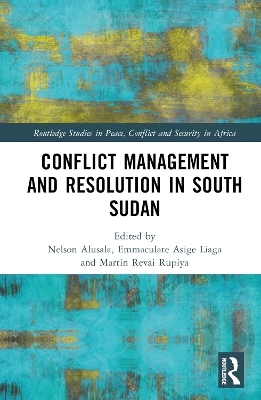
Conflict Management and Resolution in South Sudan
Routledge (Verlag)
978-1-032-53093-2 (ISBN)
This book analyses the main events and turning points in the building of pre- and post-independent South Sudan. It covers the historical perspectives of the country, its key political, mediation and negotiation processes, peace and security, socio-economic development, and gender, as well as conflict and reconstruction.
Many African states are products of compromised peace settlements and power sharing agreements, following violent and protracted conflicts between colonial/occupying powers, armed groups and nation states. This is the same route that Africa’s youngest nation, South Sudan traversed before attaining independence in July 2011. This edited volume is an innovative collection that serves as a complete reading on South Sudan, from the pre-independent to post-independent realities of the political, military and inter-ethnic conflicts and the negotiations to resolve them. It is a step-by-step account of the major events that mark the history as well as the contemporary occurrences in South Sudan. The book offers guidance on how to sustainably end armed conflict in Africa by tackling four broad themes that include the historical analysis of the conflict, political issues, peace and security, and gender, justice and contemporary dynamics. The book presents a gendered approach to arguments, while also reflecting gender equity in terms of the book authorship.
Academics, researchers and specialists in the field of conflict management and resolution as well as security studies will find this book useful.
Nelson Alusala is a senior research fellow at the Centre for Governance Innovation (GovInn), University of Pretoria, South Africa. He also holds a PhD in political sciences from the University of Pretoria. He has also been serving as and for the United Nations (UN) Group of Experts on the DR Congo. Emmaculate Asige Liaga is a postdoctoral fellow at the Graduate Institute’s Centre on Conflict, Development and Peacebuilding (CCDP) and an associate researcher at the Centre for African Studies, at the University of Basel, Switzerland. Martin R. Rupiya PhD, was an academic with the Institute for African Renaissance Studies (IARS), University of South Africa (UNISA) and Executive Director of The African Public Policy & Research Institute (APPRI) based in Pretoria.
1. Introduction 2. A Historical Analysis and Lessons from the 2018 Peace Agreement 3. The Missing Link in Negotiating an End to The South Sudan Conflict 4. Foreign Policy Convergence Between Sudan and Uganda on The South Sudan Peace Process? Understanding The Interests For Neighbouring States 5. The Ethnicisation of The South Sudan Conflict From 2013 to 2018: Will The Peace Agreement Hold 6. Constructing A Cohesive Foundation for Sustainable Peacebuilding in South Sudan 7. Evaluating Splm’s Legacies Of Conflict Resolution Initiatives in South Sudan 8. Who Are The Main External Actors in The Quest For Peace in South Sudan and Why Did They Fail To Achieve Peace in The Young State? 9. Why The Failure of Power-Sharing Agreements in South Sudan (2014 – 2016) 10. Gender And The Conflict in South Sudan 11. Women, Mediation And Leadership in South Sudan 12. Contextualising Transitional Justice in South Sudan: Whose Justice?
| Erscheinungsdatum | 10.08.2023 |
|---|---|
| Reihe/Serie | Routledge Studies in Peace, Conflict and Security in Africa |
| Verlagsort | London |
| Sprache | englisch |
| Maße | 156 x 234 mm |
| Gewicht | 557 g |
| Themenwelt | Naturwissenschaften ► Geowissenschaften ► Geografie / Kartografie |
| Sozialwissenschaften ► Politik / Verwaltung ► Europäische / Internationale Politik | |
| Sozialwissenschaften ► Soziologie ► Spezielle Soziologien | |
| ISBN-10 | 1-032-53093-6 / 1032530936 |
| ISBN-13 | 978-1-032-53093-2 / 9781032530932 |
| Zustand | Neuware |
| Haben Sie eine Frage zum Produkt? |
aus dem Bereich


